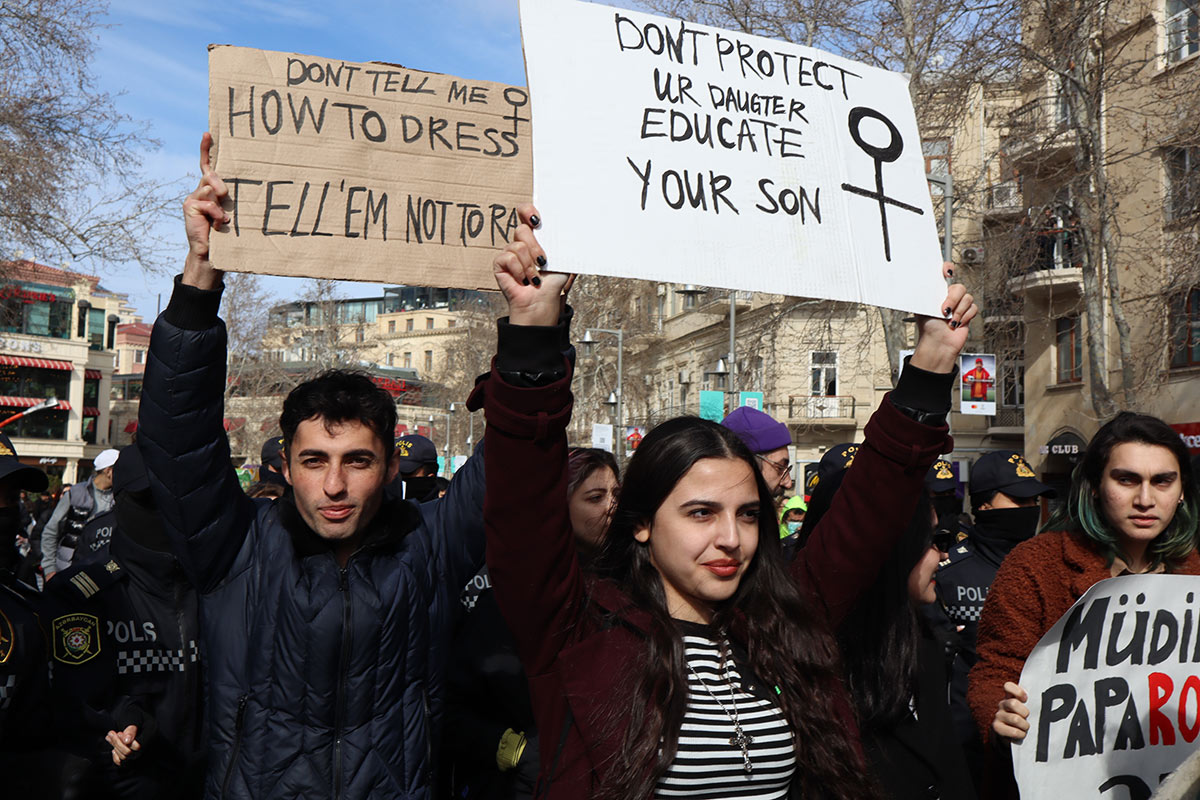Revealing photographs of journalists and activists are proliferating on social media. Many Azerbaijanis, and the women themselves, suspect they were planted by the country’s authoritarian government as revenge against speaking out. The government denies the claims.
In mid-February, Azerbaijani activist Bakhtiyar Hajiyev escalated a month-long hunger strike to protest his detention, announcing he would no longer even drink water.
 Azerbaijani activist Bakhtiyar Hajiyev. (Photo: Voice of America, public domain, via Wikimedia Commons)
Azerbaijani activist Bakhtiyar Hajiyev. (Photo: Voice of America, public domain, via Wikimedia Commons)
Over the next few weeks, a series of channels promising the “exposure of Bakhtiyar” began appearing on the social media app Telegram. They seemed designed to embarrass Hajiyev by spreading a trove of material stolen from his personal phone, including photographs, chats, and audio recordings of sexual encounters.
The posts, which were shared with thousands of readers, also exposed a series of women he had been in contact with over the past seven years, many of them activists and journalists themselves.
Several of the women were shown in compromising positions or nude. Others were “exposed” for just posing next to Hajiyev in public. Some of the Telegram channels dredged up old hacked images of women who had simply expressed support for the activist, or dissent from the government. Many of the posts revealed the women’s home addresses or contact information alongside intimate conversations and lewd captions.
In Azerbaijan, a culturally conservative nation on the Caspian Sea, women are still held to much more stringent standards of personal conduct than men. Even the hint of an accusation of promiscuity can lead to ostracism at work or at home.
Some of the women, who were married or engaged, were accused of having affairs with Hajiyev. “I am married,” begged one target. “If my husband sees it, and my family gets separated, will it make you happy? Delete it now!”
Such content “has power in conservative societies, especially for women, who are generally expected to be modest and chaste,” said Katy Pearce, a professor of communications at the University of Washington who researches the political use of technology in authoritarian states, including Azerbaijan.
“While male blackmail victims certainly experience harm, female victims do so even more.”
One of the women exposed in this new Telegram campaign is now in hiding. Another ran away from home after wrestling with suicidal thoughts, according to feminist activist Gulnara Mehdiyeva, who is trying to coordinate assistance for the women.
“She wanted to end her life after the materials were published,” Mehdiyeva said.
 A screenshot from a search result on Telegram for “Bakhtiyar Hajiyev” on March 2, 2023.
A screenshot from a search result on Telegram for “Bakhtiyar Hajiyev” on March 2, 2023.
Tunay Aliyeva, a well-known television personality in Azerbaijan who has moved to the U.S. , met Bakhtiyar in public seven years ago and posed for photographs with him. But the two were never close, so she was shocked to find her picture plastered across Telegram under a cover image reading: “Bakhtiyar’s Porn.”
“After Bakhtiyar took these photos, he left with her and had sex,” read the caption.
Aliyeva said she sees the publication of the material as a serious feminist issue.
“The titles and the texts are all about exposing women,” she said. “The target is not just Bakhtiyar. The target is Azerbaijani women.”
Narmin Shahmarzade, a 24-year-old women’s rights activist who publicly supported Bakhtiyar, had half-naked photographs and an audio recording of her having sex published on one of the Telegram channels with the caption: “Here is Narmin Shahmarzade.”
She told OCCRP the photographs were first leaked in 2021 after hackers infiltrated her social media accounts in the run up to an International Women’s Day event she had helped organize.
“Those photos are taken from my Facebook and email accounts,” she said. “They share those again at this time, because we actively supported Bakhtiyar.”
“I don’t feel bad or depressed now, because I am already over it. But I know what those [other] girls are going through,” she said.
“Exposed” by the Government?
It is difficult to prove who is behind the “exposed” channels, but in recent years Azerbaijan has seen a spate of personal content released online. Many suspect the Azerbaijani government, noting that activists and journalists have been frequent targets.
Some of the material posted on Telegram was only held on their phones, and had never been shared on social media, people targeted in the campaign told OCCRP. Several of the victims said their conversations had been doctored before being published.
“Due to the quantity of material they had access to and the sophistication of the attack, all signs point to an entity with a great deal of resources — resources that a private individual would likely not have,” said Pearce, from the University of Washington.
 Police at the most recent International Women’s Day event in Azerbaijan in March 2023. (Photo: Meydan TV)
Police at the most recent International Women’s Day event in Azerbaijan in March 2023. (Photo: Meydan TV)
Azerbaijan’s government has denied having anything to do with the campaign against Hajiyev. A spokesman for the powerful Internal Affairs Ministry told pro-government media it was investigating several complaints by the women who were targeted, but he wouldn’t confirm the details when asked for comment by OCCRP. The spokesman, Elshad Hajiyev, also declined to answer other questions about the campaign against Hajiyev.
However, several reports from international tech and advocacy groups have found credible evidence that the government — and specifically Internal Affairs — has coordinated hacking campaigns against its own citizens.
Last year, the internet giant Meta said it had disrupted a “complex” cyber-espionage group run out of the ministry that targeted government critics, journalists, and democracy activists through tactics like phishing and hacking. Qurium, a nonprofit specializing in digital forensics, also released a report in 2020 showing how phishing attacks against prominent human rights defenders and journalists were coming from the Internal Affairs Ministry’s digital infrastructure, and may have been coordinated by an employee with the handle “sandman4812.”
Azerbaijan was also outed as a major user of Pegasus spyware in the Pegasus Project, a 2021 collaborative journalism project coordinated by Forbidden Stories.
While reporting on the project, OCCRP found Azerbaijan’s government had selected more than 40 activists, journalists, and their family members — including Hajiyev — to target with the spyware. Pegasus can gain full access to a mark’s phone and be used to read text messages, access photographs and passwords, and even make secret recordings.
Arzu Geybulla, an activist and the founder of Azerbaijan Internet Watch, which tracks internet censorship and surveillance in the country, said online attacks have escalated.
“I’d say it’s become more apparent in the last five years,” she said.
Mehdiyeva, the feminist activist, has been hacked by her own government before. Private telephone conversations in which she discussed mental health issues with friends, were leaked in 2020 — like Shahmarzade, around the time she helped organize an event to celebrate International Women’s Day.
“They tried to portray me as schizophrenic,” she recalled.
Qurium later discovered forensic evidence that Mehdiyeva’s accounts were hacked by “sandman4812,” the same person believed to have orchestrated campaigns for Azerbaijan’s Ministry of Internal Affairs.
During the recent onslaught against women on Telegram, Mehdiyeva was also threatened with further exposure: “This is nothing yet: They will recognize you too, Gulnara Mehdiyeva,” one post said.
She told OCCRP that she lives constantly braced for another attack. “They haven’t shared anything yet. I don’t have anything related to Bakhtiyar to be shared. But I’m expecting anything.”
Targeted on Telegram
Telegram became immensely popular in Azerbaijan in 2020, after it became a vital information-sharing platform during the country’s 44-day war with Armenia. Journalists and activists flocked to the app as it promised more security than Facebook, which had been the site of several high-profile hackings.
The platform bills itself as a safer alternative to Facebook because it offers end-to-end encryption of messages and calls. And unlike Signal, another encrypted messaging service, Telegram allows people to create “channels,” instantly gaining access to hundreds or even thousands of readers.
“After determining that our correspondence on Facebook was already at risk and could be hacked very easily, civil society began to look for secure correspondence channels, and thus Telegram … entered our lives,” said Mehdiyeva, the activist.
But, she said, it has a weak spot: “Moderation on Telegram is poor, very poor. On Facebook, for example, you can get an immediate reaction to pornographic content. But … such controls are quite weak on Telegram.”
Telegram’s founder, Pavel Durov, has touted this lack of moderation as a strength, saying his platform does not censor its users. “Instead of putting an end to wrong ideas, censorship often makes it harder to fight them,” he said in 2021.
But for the women whose private photographs have been exposed, this laissez-faire attitude makes it hard to fight back. Three of the “exposure” Telegram channels have been taken down, but at least 18 more remained at the time of publication.
 Protesters advocating for equality in Azerbaijan on International Women’s Day in March 2023. (Photo: Meydan TV)
Protesters advocating for equality in Azerbaijan on International Women’s Day in March 2023. (Photo: Meydan TV)
Geybulla said Telegram never responded to their reports of the channels that were sharing pornographic content.
“We never heard back,” she said. “No answer came, but those pages remained.”
A BBC News investigation last year found large groups and channels sharing “thousands of secretly filmed, stolen or leaked” images of women from at least 20 countries. After the BBC reported 100 of the pornographic images to Telegram, 96 remained on the app a month later. Telegram didn’t even take action when BBC journalists reported having been offered child pornography on the platform.
Telegram did not respond to a request for comment.
Azerbaijani women have not been protected by law enforcement, either. According to Azerbaijan Internet Watch’s most recent annual report, the government has failed to provide effective legal remedies against state-sponsored digital attacks and surveillance.
“Despite evidence-based reports of targeted and coordinated cyber attacks against activists, the government thus far has not investigated and/or provided effective legal guarantees,” the report concluded.
Tunay Aliyeva agreed, saying she sees no hope in making an official complaint to the police about the material posted about her on Telegram. Instead, she penned a public appeal to Mehriban Aliyeva, the wife of the country’s authoritarian ruler, asking her to intervene on behalf of the women of Azerbaijan. So far, she has had no response.
Activists Mehdiyeva and Shahmarzade say they received no response to complaints they filed about the hacks of their accounts. Now, they have submitted cases to the European Court of Human Rights arguing Azerbaijani authorities not only failed to intervene, but may have been involved in the attacks.
Hajiyev has also filed a case at the court, one of his lawyers, Elchin Sadigov, told the Azerbaijani media outlet Abzas. Still, the release of the photos may have already had their intended effect: After the leaks began, Hajiyev ended his hunger strike.
The collateral damage to the women who were “exposed” is just beginning, however. Shahmarzade said she finds it hard to ever relax knowing the material is out there.
“We’re all living as if we’re in constant danger,” she said. – OCCRP
Stay informed with The Namibian – your source for credible journalism. Get in-depth reporting and opinions for
only N$85 a month. Invest in journalism, invest in democracy –
Subscribe Now!










